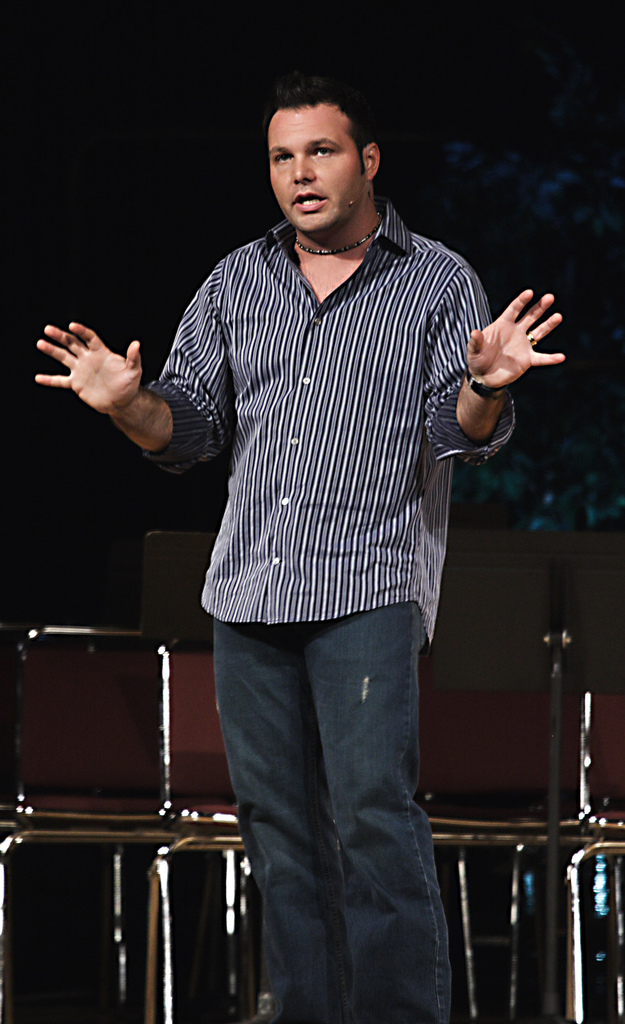 My friend Ian Ebright over at Broken Telegraph made the following post available to me. I asked Ian what church discipline ought to look like in the wake of the revelation over at Matthew Paul Turner’s site: a fellow at Seattle’s Mars Hill who confided to some indiscretions was met with what some consider an appalling lack of human kindness. You can read all about it on MPT’s site. You can read Ian’s thoughts on the matter and the problem of insulated churches here. Ian asked a prominent pastor to respond to the question of what church discipline ought to look. The pastor’s name has been kept anonymous by request.
My friend Ian Ebright over at Broken Telegraph made the following post available to me. I asked Ian what church discipline ought to look like in the wake of the revelation over at Matthew Paul Turner’s site: a fellow at Seattle’s Mars Hill who confided to some indiscretions was met with what some consider an appalling lack of human kindness. You can read all about it on MPT’s site. You can read Ian’s thoughts on the matter and the problem of insulated churches here. Ian asked a prominent pastor to respond to the question of what church discipline ought to look. The pastor’s name has been kept anonymous by request.
By Anon
I’ll be teaching a group of students today out of I Corinthians 5, which is a sort of ‘classic text’ regarding church discipline. The subject has been in the news a fair bit lately, and even if it hasn’t, it’s an important subject in it’s own right. Over the past years, there’s been shock over the repeated passivity of church authority when priests have been charged with molestation, pedophilia, and other abusive activities. Protecting predators is viewed, rightly, with anger – especially when predators are in positions of authority. If a church knows that one of its own leaders is involved in activities that utterly misrepresent Christ, the church is called to act, according to both Matthew 18 and I Corinthians 5.
These two passages, though, apply to more than just leaders. They apply to everyone in the church, because everyone who has declared their commitment to a particularly local expression of church life is committing to that church’s value structure, a structure that hopefully represents, in some measure, the heart of Christ. We’re called to hold each other accountable because, if we’re going to wear the t-shirt that says we belong to Jesus, we need to help each other look like Jesus.
This is, of course, precisely where the rub comes because without severe limitations on this action, we run the risk of becoming the Taliban, both in our levels of scrutiny, and punishment, and hypocrisy. Unrestricted control of fallen people, in the name of ‘discipline’ doesn’t just turn people off from a particular local church- it turns people off to Christ. For that reason, the misuse of discipline needs to be held up to the light of scripture and exposed. So let’s consider these two important passages in the Bible in order to get a clearer picture of the principles at stake:
1. In Matthew 18, the road to church discipline begins with someone whose sin is in need of exposure because they’re hiding it, at least from others, probably from themselves. The passage reads, “If your brother sins, go and show him his fault in private…” This means that if someone goes to the church and preemptively exposes their fault, it’s not discipline time, it’s restoration time. The person has confessed their sin, and the word confession, “to say the same thing” which means that they agree their action/activity was wrong and destructive.
2. In I Corinthians 5 the pattern of an unhealthy sexual relationship is the context, but again, Paul makes it clear that the reason discipline is enjoined is because the person is involved in destructive patterns but either refuses to acknowledge that it’s destructive, or refuses to take steps to change. To apply the passage to someone who has preemptively confessed a sin is to foster exactly the opposite environment of both Paul’s and Jesus’ intent, namely that of living freely in the light. This is too important to pass over, because it’s right here that the church has historically failed over and over again. Called to invite people into the light of grace, and the transforming power of Christ’s forgiveness, we’ve overwhelmingly created environments where it’s easier to hide in darkness because “if people really knew…”
This isn’t just about sexual sin. “If people really knew my drinking problem” or “my anger problem” or “my addiction to shopping and financial mess I’m in because of it” or whatever it is; your pride, your arrogance, your cold marriage. It’s actually liberating to take discipline as seriously as Paul takes it, because then you begin to see that Paul’s trying to create an environment where the bar remains high, and people are encouraged, as James exhorts, to confess their sins to one another, that they may be healed.
In I Corinthians 5 the person isn’t confessing, and the church isn’t confronting. Instead everyone’s ignoring. Many of the pixels spilled in the last week seem shocked that the church would take any role of intervention at all in someone’s personal choices. Part of Paul’s point in this letter to Corinth, though, is that personal choices are no longer personal when you associate with a community. The company for which you work has values, ethics, which represent their culture. Try ignoring those. Show up late, barefoot, smoking weed, and spend your day in chat rooms. I promise you, your employer will be less gracious than the church. You can’t belong to anything worth joining without agreeing to live within the ethos and culture of that thing – and the church has, or should have, a high ethos.
On the other hand, a healthy church won’t be filled with people who embody perfection, because perfection doesn’t exist (see I Jn. 1:8-10). Instead we’ll embody a trajectory, both individually and collectively, of transformation – as Paul says, “from glory to glory…” (II Corinthians 3:18) This means our brokenness will be seen sometimes, just like David’s was, or Moses’, or Jacob’s, or Abraham’s, or Peter’s. We can all find snapshots of sin with which to vilify one another. But God is interested in the movie, not the snapshot, and that’s why David, who was quick to confess his sin once it was exposed, was called a ‘man after God’s own heart’. Churches that fixate on the snapshots and use them to control others are missing the point in both big, and bad ways.
I’ll note that the scriptures offer no precedent for mining confession of further sin, no precedent for shunning one who has confessed. Every indication is that Paul calls the church to restore the man in I Corinthians 5 when he writes II Corinthians 2, warning that someone who’s repented but continues to be treated like someone who is sinning, knows he’s sinning, and doesn’t care, is a terribly destructive thing to do.
So there you have it. Some might be angry because I’ve challenged the idol of unrestricted individualism that saturates our culture. Others will be angry that I challenge the unrestricted authority of church leaders to intervene in the lives of broken people whose hearts are tender enough to confess sin and seek to live like Jesus. But both paths miss the point, which is to create a community of truth and grace. Unrestricted elevation of individualism kills truth. Unrestricted elevation of church authority kills grace. A third path is needed… one that fosters truth AND grace. That path, narrow though it be, is the only real way of Jesus.











